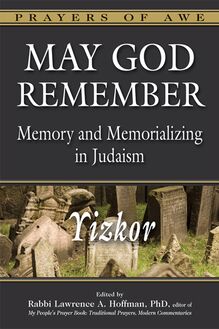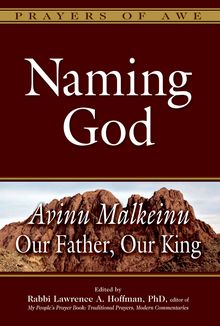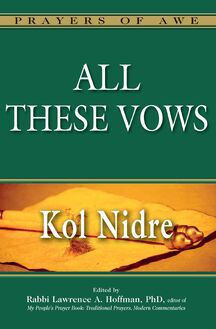All the World , livre ebook
199
pages
English
Ebooks
2014
Vous pourrez modifier la taille du texte de cet ouvrage
Obtenez un accès à la bibliothèque pour le consulter en ligne En savoir plus
Découvre YouScribe en t'inscrivant gratuitement
Découvre YouScribe en t'inscrivant gratuitement
199
pages
English
Ebooks
2014
Vous pourrez modifier la taille du texte de cet ouvrage
Obtenez un accès à la bibliothèque pour le consulter en ligne En savoir plus
Publié par
Date de parution
19 août 2014
Nombre de lectures
1
EAN13
9781580238113
Langue
English
Poids de l'ouvrage
1 Mo
Why be Jewish?
A fascinating dialogue across denominations of the High Holy Days and their message of Jewish purpose beyond mere survival.
Almost forty contributors from three continents—men and women, scholars and poets, rabbis and theologians, representing all Jewish denominations and perspectives—examine the tension between Israel as a particular People called by God, and that very calling as intended for a universalist end, furthering God's vision for all the world, not just for Jews alone. This balance of views arises naturally out of the prayers in the High Holy Day liturgy, coupled with insights from philosophy, literature, theology and ethics.
This fifth volume in the Prayers of Awe series provides the relevant traditional prayers in the original Hebrew, alongside a new and annotated translation. It explores the question "Why be Jewish?" in a time when universalist commitment to our planet and its people has only grown in importance, even as particularist questions of Jewish continuity have become ever more urgent.
Prayers of Awe: A multi-volume series designed to explore the High Holy Day liturgy and enrich the praying experience for everyone—whether experienced worshipers or guests who encounter Jewish prayer for the very first time.
Contributors
Rabbi Bradley Shavit Artson, DHL
Rabbi Tony Bayfield, CBE, DD
Rabbi Will Berkovitz
Dr. Annette M. Boeckler
Dr. Erica Brown
Rabbi Lawrence A. Englander, CM, DHL, DD
Rabbi Lisa Exler
Rabbi Shoshana Boyd Gelfand
Rabbi Laura Geller
Rabbi Edwin Goldberg, DHL
Rabbi Andrew Goldstein, PhD
Dr. Joel M. Hoffman
Rabbi Lawrence A. Hoffman, PhD
Rabbi Walter Homolka, PhD, DHL
Rabbi Elie Kaunfer, DHL
Rabbi Reuven Kimelman, PhD
Dr. Mark L. Kligman
Rabbi Noa Kushner
Rabbi Daniel Landes
Rabbi Asher Lopatin
Catherine Madsen
Rabbi Jonathan Magonet, PhD
Rabbi Dalia Marx, PhD
Ruth Messinger
Rabbi Charles H. Middleburgh, PhD
Rabbi Jay Henry Moses
Rabbi Rachel Nussbaum
Rabbi Jack Riemer
Rabbi Jeffrey K. Salkin, DMin
Rabbi Marc Saperstein, PhD
Rabbi Dennis C. Sasso, DMin
Rabbi Sandy Eisenberg Sasso, DMin
Rabbi Jonathan P. Slater, DMin
Rabbi David A. Teutsch, PhD
Rabbi Margaret Moers Wenig, DD
Rabbi Daniel G. Zemel
Dr. Wendy Zierler
Acknowledgments ix
Introduction: In General and in Particular, the Moral and
Theological Dilemma of Our Time 1
Rabbi Lawrence A. Hoffman, PhD
Part I Universalism and Particularism: Speaking Generally
Why Be Jewish? The Universalist Message of the High Holy Days 11
Rabbi Lawrence A. Hoffman, PhD
Monotheism, Mission, and Multiculturalism: Universalism Then and Now 30
Dr. Annette M. Boeckler
A Sage among the Gentiles? A Halakhic Lesson on Moral Universalism 40
Rabbi Daniel Landes
Universalism, Transnationalism, and the Challenge of Triumphalism 45
Rabbi David A. Teutsch, PhD
The Prayer for the State of Israel: Universalism and Particularism 49
Rabbi Dalia Marx, PhD
The Music of V'ye'etayu—"All the World" 77
Dr. Mark L. Kligman
Part II Views from Philosophy and Literature
For a Judaism of Human Concerns 85
Rabbi Walter Homolka, PhD, DHL
All Peoples Will Break into Song, but the Song Will Be Hebrew 91
Rabbi Bradley Shavit Artson, DHL
Is Judaism Too Important to Be Left Just to Jews? The Sh’ma and the Alenu 98
Rabbi Reuven Kimelman, PhD
"We" and “They” in Jewish Liturgy 107
Rabbi Jonathan Magonet, PhD
All Shall Come to Serve (My Version of) Thee 112
Dr. Wendy Zierler
Part III “All the World” Remembered: Its Impact on Generations
Two Kinds of Universalism 123
Rabbi Marc Saperstein, PhD
The Missing Hymn: “All the World Shall Come to Serve Thee” 128
Rabbi Andrew Goldstein, PhD
Part IV The Liturgy
Translation of the Liturgy and Commentary 135
Dr. Joel M. Hoffman
“All the World,” by Israel Zangwill 151
From Union Prayer Book, Newly Revised Version
Part V Interpretations from the Field
Worshiping in Technicolor; Seeing Others in Black and White 155
Rabbi Tony Bayfield, CBE, DD
“I Didn’t Do It!”: A Rosh Hashanah Nightmare 160
Rabbi Will Berkovitz
An Open Door 164
Dr. Erica Brown
Our Jewish Golden Rule 168
Rabbi Lawrence A. Englander, CM, DHL, DD
A “Light unto the Nations” or a “People Who Dwell Alone”? 173
Rabbi Shoshana Boyd Gelfand
A Snowball That Cannot Melt 178
Rabbi Laura Geller
Laughing Islands, Dancing Prayer Books 183
Rabbi Edwin Goldberg, DHL
“One True Religion” or “Any Number Can Play”? 188
Dr. Joel M. Hoffman
Crowning “the Un-king” King 192
Rabbi Elie Kaunfer, DHL
They Are Us: Uv’khen and T’shuvah 197
Rabbi Noa Kushner
Iftar in the Synagogue: Jewish-Muslim Relations, from the Pages of the Machzor 200
Rabbi Asher Lopatin
The Acidic Masters 204
Catherine Madsen
Word and World: From Faith to Action 209
Ruth Messinger and Lisa Exler
“So Loud Your Praise Shall Sing” 213
Rabbi Charles H. Middleburgh, PhD
A Synthesis of Hope 217
Rabbi Jay Henry Moses
Melekh al Kol Ha’aretz: Just How Jewish Is Rosh Hashanah, Anyway? 221
Rabbi Rachel Nussbaum
Let It Be! Let It Be! Let It Be! 226
Rabbi Jack Riemer
What We Can All Believe 230
Rabbi Jeffrey K. Salkin, DMin
The Dance of the One and the Many 235
Rabbi Sandy Eisenberg Sasso, DMin, and Rabbi Dennis C. Sasso, DMin
In God, Even the Infinite Becomes One 240
Rabbi Jonathan P. Slater, DMin
Yoga Poses for the Mind: Wrapping Our Minds around It All 244
Rabbi Margaret Moers Wenig, DD
Universal in Vision, Particular by Necessity 248
Rabbi Daniel G. Zemel
Notes 252
Glossary 263
Publié par
Date de parution
19 août 2014
Nombre de lectures
1
EAN13
9781580238113
Langue
English
Poids de l'ouvrage
1 Mo
Send Us Your Feedback
Click here to send us your feedback and be entered into our quarterly drawing for a $100 gift certificate for Jewish Lights books.
Thank you for purchasing this Jewish Lights eBook!
Sign up for our e-newsletter to receive special offers and information on the latest new books and other great eBooks from Jewish Lights.
Sign Up Here
or visit us online to sign up at www.jewishlights.com .
Contents
Acknowledgments
Introduction: In General and in Particular, the Moral and Theological Dilemma of Our Time
Rabbi Lawrence A. Hoffman, PhD
PART I UNIVERSALISM AND PARTICULARISM: SPEAKING GENERALLY
Why Be Jewish? The Universalist Message of the High Holy Days
Rabbi Lawrence A. Hoffman, PhD
Monotheism, Mission, and Multiculturalism: Universalism Then and Now
Dr. Annette M. Boeckler
A Sage among the Gentiles? A Halakhic Lesson on Moral Universalism
Rabbi Daniel Landes
Universalism, Transnationalism, and the Challenge of Triumphalism
Rabbi David A. Teutsch, PhD
The Prayer for the State of Israel: Universalism and Particularism
Rabbi Dalia Marx, PhD
The Music of V ye etayu - All the World
Dr. Mark L. Kligman
PART II VIEWS FROM PHILOSOPHY AND LITERATURE
For a Judaism of Human Concerns
Rabbi Walter Homolka, PhD, DHL
All Peoples Will Break into Song, but the Song Will Be Hebre w
Rabbi Bradley Shavit Artson, DHL
Is Judaism Too Important to Be Left Just to Jews? The Sh ma and the Alenu
Rabbi Reuven Kimelman, PhD
We and They in Jewish Liturgy
Rabbi Jonathan Magonet, PhD
All Shall Come to Serve (My Version of) Thee
Dr. Wendy Zierler
PART III ALL THE WORLD REMEMBERED: ITS IMPACT ON GENERATIONS
Two Kinds of Universalism
Rabbi Marc Saperstein, PhD
The Missing Hymn: All the World Shall Come to Serve Thee
Rabbi Andrew Goldstein, PhD
PART IV THE LITURGY
Translation of the Liturgy and Commentary
Dr. Joel M. Hoffman
All the World, by Israel Zangwill
From Union Prayer Book, Newly Revised Version
PART V INTERPRETATIONS FROM THE FIELD
Worshiping in Technicolor; Seeing Others in Black and Whit e
Rabbi Tony Bayfield, CBE, DD
I Didn t Do It! : A Rosh Hashanah Nightmare
Rabbi Will Berkovitz
An Open Door
Dr. Erica Brown
Our Jewish Golden Rule
Rabbi Lawrence A. Englander, CM, DHL, DD
A Light unto the Nations or a People Who Dwell Alone ?
Rabbi Shoshana Boyd Gelfand
A Snowball That Cannot Melt
Rabbi Laura Geller
Laughing Islands, Dancing Prayer Books
Rabbi Edwin Goldberg, DHL
One True Religion or Any Number Can Play ?
Dr. Joel M. Hoffman
Crowning the Un-king King
Rabbi Elie Kaunfer, DHL
They Are Us: Uv khen and T shuvah
Rabbi Noa Kushner
Iftar in the Synagogue: Jewish-Muslim Relations, from the Pages of the Machzor
Rabbi Asher Lopatin
The Acidic Masters
Catherine Madsen
Word and World: From Faith to Action
Ruth Messinger and Lisa Exler
So Loud Your Praise Shall Sing
Rabbi Charles H. Middleburgh, PhD
A Synthesis of Hope
Rabbi Jay Henry Moses
Melekh al Kol Ha aretz : Just How Jewish Is Rosh Hashanah, Anyway?
Rabbi Rachel Nussbaum
Let It Be! Let It Be! Let It Be!
Rabbi Jack Riemer
What We Can All Believe
Rabbi Jeffrey K. Salkin, DMin
The Dance of the One and the Many
Rabbi Sandy Eisenberg Sasso, DMin, and Rabbi Dennis C. Sasso, DMin
In God, Even the Infinite Becomes One
Rabbi Jonathan P. Slater, DMin
Yoga Poses for the Mind: Wrapping Our Minds around It All
Rabbi Margaret Moers Wenig, DD
Universal in Vision, Particular by Necessity
Rabbi Daniel G. Zemel
Notes
Glossary
About the Editor
Copyright
Also Available
About Jewish Lights
Acknowledgments
I wish to begin by thanking the many readers of this series and of the prior set of volumes, My People s Prayer Book , who write to thank me for them. To these worshipers in general, I add the many colleagues, artists, composers, poets, philosophers, theologians, and critics who advise me with regularity. Many of them are included here. To them-to all the contributors whose commentaries found their way into this volume-I am grateful.
I continue to be blessed with support from my extraordinary publisher, Stuart M. Matlins, founder of Jewish Lights, and from Emily Wichland, vice president of Editorial and Production there. It was Stuart who first approached me with the idea for the Prayers of Awe series, as suggested to him by Dan Adler in response to a High Holy Day program developed by Rob Eshman, editor in chief of the Jewish Journal of Greater Los Angeles , and David Suissa. Their program sprang from an idea first conceived by Rabbi Elazar Muskin of Young Israel of Century City, California. Emily continues to amaze me in all she does: her abundant wisdom, skill, patience, and perseverance are precisely what an author most desires. For her copyediting, my thanks go again to Debra Corman. I happily include as well all the others at Jewish Lights, especially Tim Holtz, director of Production, who designed the cover for this book and typeset the English text.
The very act of compiling an anthology such as this is enormously challenging. Beyond the editing of each article, sometimes more than once, an enormous number of e-mails go back and forth with each and every contributor, on such matters as titles, style, and content. Contributions thus move slowly along the path toward completion, eventually to be classified as ready for the publisher and assembled in their final form. In this entire process, I have been aided immeasurably by Dr. Gayle Hoover, who has overseen the inclusion of contributions at every stage along the way.
Dr. Joel M. Hoffman worked assiduously to translate the liturgy as a whole, but also the citations from prayers cited by Rabbi Dalia Marx, PhD, from Israel.
We should be enormously grateful to all the authors mentioned. Theirs is genuinely a work of commitment and love for the tradition of Jewish worship that this book represents.
Introduction
In General and in Particular, the Moral and Theological Dilemma of Our Time
Rabbi Lawrence A. Hoffman, PhD
Rabbi Lawrence A. Hoffman, PhD, has served for more than three decades as professor of liturgy at Hebrew Union College-Jewish Institute of Religion in New York. He is a world-renowned liturgist and holder of the Stephen and Barbara Friedman Chair in Liturgy, Worship and Ritual. He has written and edited many books, including the My People s Prayer Book: Traditional Prayers, Modern Commentaries series, winner of the National Jewish Book Award; and the Prayers of Awe series ; and he is coeditor of My People s Passover Haggadah: Traditional Texts, Modern Commentaries , a finalist for the National Jewish Book Award. He cofounded and developed Synagogue 3000, a transdenominational project designed to envision and implement the ideal synagogue of the spirit for the twenty-first century.
N o man is an island, entire of itself, wrote the English poet John Donne, famously; every man is a piece of the continent, a part of the main. Yes, but what continent and what main? Are we involved in mankind, as Donne proposed; part of the long evolution of our species? Or are we answerable only to our family, our tribe, our people, our nation-or some other localized something or other that, whatever we name it, is less than humanity writ large.
To be human is to know firsthand these two perspectives, universalism and particularism: the first, an extended feeling of kinship with all humanity; and the second, the natural tendency to feel most at home with our own kind. They derive from the same source: the basic human need to reach beyond ourselves and affirm relationships with others. But they need not go together, and they may even be in conflict. There can hardly be a more important issue for our time than the need to balance the two.
In the evolution of human societies, particularism came first: the solidarity of small groups that arose in prehistoric times and, eventually, matured into tribal societies, each with its own culture, language, religion, and categories of thought. They are what anthropologists traditionally study in their fieldwork, but not, on that account, limited to so-called primitives. When the anthropologists return to their own communities, they experience the same sense of knowing they are home-the way even the most intrepid traveler does when the plane hits familiar tarmac and you feel once again that you are on familiar ground. In its rawest form, it is the sense of knowing you are among us rather than them.
Eventually, all but the most isolated tribal units become aware of their neighbors and discover that, to some degree at least, these strangers are not just them but an extension of us, an expression of humanity at large. In Western culture, the high point in this turn to universalism occurred in the eighteenth-century phenomenon that we call the Enlightenment, an extension of the prior century s turn to science. Scientific principles are, by definition, universal: they hold everywhere, among all people; they play no favorites. The language of mathematics holds everywhere in the universe, no matter where we live upon it; we all can read it.
Part and parcel of the scientific method is an emphasis on reason, which, again, is universal, the means by which thoughtful people who speak different languages at home solve universal equations together. The age of science, therefore, is similarly characterized by what we call the Age of Reason, a period when educated men and women were intoxicated by the heady possibility of a common human family united in reasoning together. Think of Isaac Newton (1642-1727), Gottfried Wilhelm Leibniz (1646





